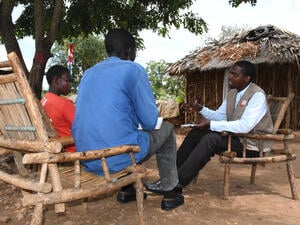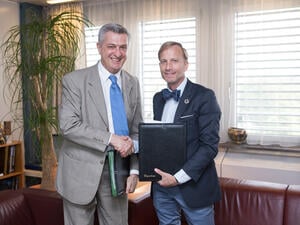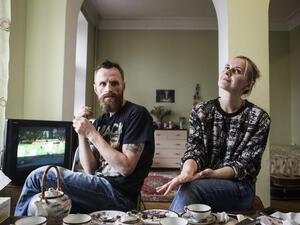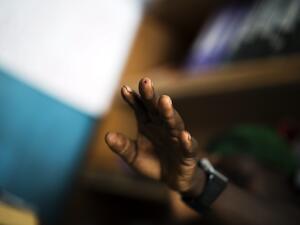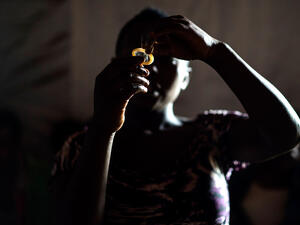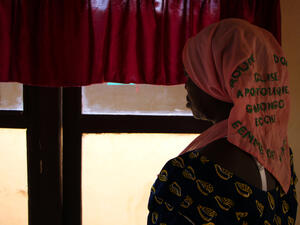With support from UNHCR, refugees in Botswana can now access ARVs
With support from UNHCR, refugees in Botswana can now access ARVs

A young refugee in Botswana. A new UNHCR programme will help refugees, including children, living with HIV in the country.
DUKWI, Botswana, May 25 (UNHCR) - Squealing with delight, young Elvis rushes off to greet his mother as she wends her way towards the family's hut in north-eastern Botswana's Dukwi refugee camp.
The Zimbabwean infant, aged almost three, is a picture of health. But one year ago, carrying the Human Immunodeficiency Virus (HIV), he was near death's door. Elvis could barely sit up. His body was wracked with opportunistic infections, including tuberculosis, and he was constantly in hospital for treatment.
The infection was passed on by his mother, Silibaziso, a former opposition activist who fled with her family to Botswana fearing physical harm after Zimbabwe's presidential and parliamentary elections in 2008. Knowing that her son needed antiretroviral (ARV) drugs to survive, she badgered UNHCR for help.
"I used to come to the UNHCR office every day and beg to be transferred to another refugee camp in the region, where Elvis could access ARVs," Silibaziso recalls. That was impossible because the government only allowed Botswanan citizens to receive antiretroviral treatment in a country that has the third highest rate of HIV infection in Africa, according to UN figures.
But the refugee agency repeatedly urged Botswana to change its policy and, thanks to this persistence, the government in April 2009 agreed to let UNHCR provide United States-backed programmes for HIV prevention and treatment targeting refugees.
The change in policy came just in time to save Elvis, but many others had died before they could get access to antiretroviral drugs, which can keep HIV infection in check and minimize opportunistic infections, thus helping to prolong life.
"On average, HIV-positive refugees were dying at the rate of four per month. It was a serious protection issue," explained Marcella Farelly-Rodriguez, a UNHCR protection officer based in Dukwi. Before the introduction of the new HIV programme in April last year, around two-thirds of all deaths in Dukwi between January and May were caused by AIDS.
Once the new government policy was announced, UNHCR held a meeting with the refugees in Dukwi and invited those seeking help to get in touch with UNHCR or staff from the agency's implementing partner, the Botswana Red Cross. "I was the first in line to get treatment for Elvis," Silibaziso Mpofu reveals.
The refugees at Dukwi can now go for voluntary HIV tests at the government-run health centre in the camp. If found positive, they receive counselling through the Botswana Red Cross. They are then transported to the Tati River clinic in Francistown, about 90 minutes away, for further tests and the free provision of ARV drugs if they need them.
So far, 200 refugees have registered with the programme, of whom 130 people require ARV treatment. A community-based Prevention of Mother-to-Child Transmission programme has also been launched in the settlement, along with other prevention campaigns.
"UNHCR advocates for refugees to be included in national HIV programmes and while ideally this is what UNHCR would like to have in Botswana, for now we are grateful that the government has allowed refugees to have access to treatment, even though it is through a parallel programme," said Gloria Puertas, UNHCR's senior regional HIV/AIDS coordinator.
Thembay Mguni, a Zimbabwean refugee who works with the Botswana Red Cross, said the number of people requesting testing "has gone up and the stigma of being HIV-positive is being reduced. Before, people would say why should we test, there is no medicine - but all that has changed."
Meanwhile, Elvis clings to his mother's skirt, as she turns to walk back toward the Botswana Red Cross office where she is a peer counsellor. She gently peels his hands away and puts him the care of her sister while she is at work. "I love you Elvis, I will be back soon, "she tells him, adding: "I am so grateful to the government of Botswana and UNHCR for getting him this treatment. I do not think he would be here now if it hadn't been available for much longer."
Botswana hosts more than 3,000 refugees in Dukwi, mainly from Zimbabwe, Namibia, Angola, Somalia, Democratic Republic of the Congo, Rwanda and Burundi. The government provides education and health care in Dukwi.
By Tina Ghelli in Dukwi, Botswana


